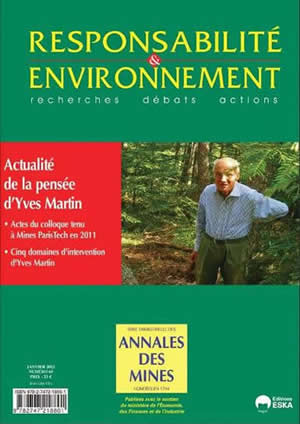 N° 65 - January 2012 - The relevancy of Yves Martin’s ideas N° 65 - January 2012 - The relevancy of Yves Martin’s ideas
Issue editor: Pierre BOISSON
Ingénieur général des Mines honoraire
Foreword: Pierre BOISSON,
Ingénieur général des Mines honoraire
and
Pierre COUVEINHES,
Rédacteur en chef des Annales
des Mines
Yves Martin, who passed away in 2010, pursued a career in the French administration. He exercised decisive influence on public policies in fields related to the environment, risks and energy. The issues that he addressed are still on the agenda; and many of the instruments that he proposed have turned out to be, now more than ever, the right responses to questions involving our country’s, or even the planet’s, future.
The first part of this special issue groups accounts from persons who had professional contacts with Yves Martin and attended a colloqui um held on 19 May 2011 at Mines ParisTech. In the second part, texts by Yves Martin have been arranged under five major headings, each introduced by a specialist.
Water and the environment
Yves Martin thought that economic incentives are more effective than regulations for managing a natural resource such as water, since they lead individuals to adopt behaviors in line with the gen eral interest. His vision of the right management of water resources can be summarized as follows: “Watercourses and groundwater should be sufficiently replenished, and water should be of good quality and fill users’ needs at a minimum cost for the community while conserving aquatic environments”.
He defended these principles when criticizing the legislation applied to water resources. According to him, it was not judicious to estab lish a Malthusian set of regulations that subjected catchment to obtaining prior authorization and considerably restricted access to water under ground. On the contrary, he felt that public interven tions should rely on incentives for drawing groundwater (at least from most aquifers) rather than using surface water. For this pur pose, he proposed combining financial incentives (geographically modulated in significant ways depending on the aquifer) with regu lations about how to protect this resource and about the technical conditions for tapping it (the duty to measure the quantity). The job of providing economic incentives should be handed over to water agencies (operating on a system of privileges and royalties) whereas the actions of regulation and prevention should be the duty of ser vices that police the water supply. Public authorities should use the most effective tools and know how to combine them: regulation through water royalties, financial incentives and, if need be, penal sanctions.
Yves Martin called for heavily adjusting water royalties so as to send an economic signal to users. To work as an incentive, royalties should be set high enough to affect stakeholders. Instead of being uniform, rates should take into account the costs of the measures users have to adopt for the general interest. This entailed criticism of the French fiscal tradition with its preference for low rates and a broad tax base.
The greenhouse effect, climate and forests
Given the countries that had not signed the Kyoto Protocol but will significantly increase their emissions of greenhouse gases, Yves Martin was, in 2002, pessimistic about reaching the objectives set under the agreement for 2012. By 2007, he was skeptical about defining a priori a formula for fairly distributing emission targets among countries. The 2009 Copenhagen Conference proved him right…
He also had reservations about a system of tradeable permits for greenhouse gases, since it would be hard to control and subject to strong speculation. Instead, he incessantly argued for a worldwide carbon tax. Its effectiveness would mainly depend on how progres sive it would be and on how foreseeable the adjustment of its rates would be, with steady increases to a high level in the long run. Such a tax would send a signal about prices and motivate all parties to change behaviors related to both consumption and production. For Yves Martin, a carbon tax would allow for economic development since it makes it possible to:
- formulate a response to social issues. As a counterpart to the con sequent price hikes in fossil fuels, he advocated lowering the TVA for certain products and reducing the Social Security taxes with held on wages. In an article written with Michel Rocard, he point ed out that wages account for 38% of the Social Security budget as compared with 3,5% from fossil fuels.
- improve competitiveness, under condition that the WTO adopt measures for compensating firms in the lands that promise to reduce emissions.
- develop materials or processes (for instance, the timber industry) that emit less greenhouse gas.
Yves Martin made two observations about the French forest: the har vest of wood has more or less stagnated in recent decades, and the average price of the wood harvested has been cut in three or even four over the last thirty years. Establishing a carbon tax on fossil fuels would lead to a new equilibrium in favor of wood by increasing both the consumption of this material and, concomitantly, its price. This would have a positive impact on the environment, since timber sus tainably stocks CO2 like a wellmanaged forest. A carbon tax would thus be profitable to French forests while reducing the budget deficit (by scaling back expenditures for the fight against greenhouse gases) and lowering unemployment (by decreasing wage taxes).
Energy policy and controlling demand
Yves Martin constantly defended the idea that energy policy should not be reduced to supplyside considerations. It also had to take into account factors related to demand and consumption.
Already in 1974, he maintained that — given the necessarily diffuse, complex nature of actions for saving energy and given the commer cial force of those who, producing and selling energy, are inclined to push consumption up rather than down — a public agency was need ed that would be responsible for “selling” the idea of saving energy. Thus was created the Agence pour les Économies d’Énergie (AEE), which, in 1982, became the Agence Française pour la Maîtrise de l’Énergie (AFME), and then, in 1991, the Agence de l’Environment et de la Maîtrise de l’Énergie (ADEME).
Yves Martin constantly argued that economic leverage should be used in the field of energy. Setting prices so as to send a signal to market forces was, he thought, the most effective way to convince users to consume less. For the sake of fairness and to obtain social acceptance of his ideas, he claimed that the proposed increase in energy taxes could be offset by lowering other taxes (in particular those affecting labor costs, whence a positive impact on jobless ness). His discussion of a carbon tax for limiting greenhouse gases advanced a similar argument about a “double dividends” system.
Yves Martin always supported longterm measures with a foreseeable calendar so that stakeholders be forewarned and adapt their behaviors. He valued structural policies that were not to be dictated by the busi ness cycle alone (in particular by oil prices). For these longterm policies, he emphasized the need to act on behaviors and reduce needs instead of relying exclusively on scientific progress and reduced consumption. His steadfast ideas with regard to energy policy were characterized by a demanding precision and a remarkable capacity for anticipating the future.
Economic instruments
Yves Martin fondly recalled that Maurice Allais and Marcel Boiteux had aroused in him a curiosity for economics equal to the interest he already had in engineering. These two professors at the École des Mines led him to discover the utility of economic instruments for managing scarce resources and protecting the environment.
Environmental taxes should, in his opinion, be “heavy, not specifically attributed to protecting the environment but also devoted to covering general public expenditures”. These “ecotaxes” would be set at a “rate programmed to gradually increase over several years to allow for tech nological anticipations and an optimized choice of investments”. Their high rate would do much to restrain behaviors harmful to the environ ment. There was, he pointed out, a difference between these “genuine” green taxes and the taxes that were called “ecological” because the receipts were handed over to funds for protecting the environment.
Yves Martin — one of the first persons to call for the creation of water agencies — thought the importance of this action lay less in the subsidies to be distributed by these agencies than in the royal ties they would take in. These royalties were to send a signal that would make all stakeholders realize the value of the resource they were tapping and the cost of the pollution they were producing. Yves Martin’s approach to environmental taxes was original in many respects:
- It identified the structural problems that this fiscal system should address (for example, the use of automobiles and highway trans portation, or the value of forests).
- These fiscal measures were part of a global program with agen cies organized to manage it (the water agencies, ADEME, the interministerial mission on greenhouse gases).
- This fiscal reform had a macroecomic dimension that would favor the development of a competitive economy and of social justice owing to lower wage taxes.
- An analysis was made of the potential deviant effects of these fis cal measures, which might lead to economic decisions that were not optimal or that wasted public funds.
These thoughts about environmental taxes are valuable in the cur rent context as we face the crucial issues of managing resources, fighting against global warming, improving the competitiveness of our economy, and balancing public budgets.
Nuclear safety
Yves Martin also proved to be a visionary and pragmatist in matters related to nuclear energy, evidence of this being the note he sent to François Mitterrand on 18 February 1975, when the Socialist Party was in the opposition. This note emphasized that the risk of an acci dent, though quite limited, could not be fully eliminated. Yves Martin called for “transparency” in order to avoid arousing a groundless anxiety in public opinion and, too, for international consultations in order to “harmonize” regulations for designing, building and super vising nuclear reactors.
He also wanted all services responsible for nuclear safety to be grouped together in an independent agency under the Prime Minister. He thus foresaw the Agence de Sécurité Nucléaire (ASN), created under Act no 2006686 of 13 June 2006 (the socalled “TSN law” on transparency and nuclear security).
|




